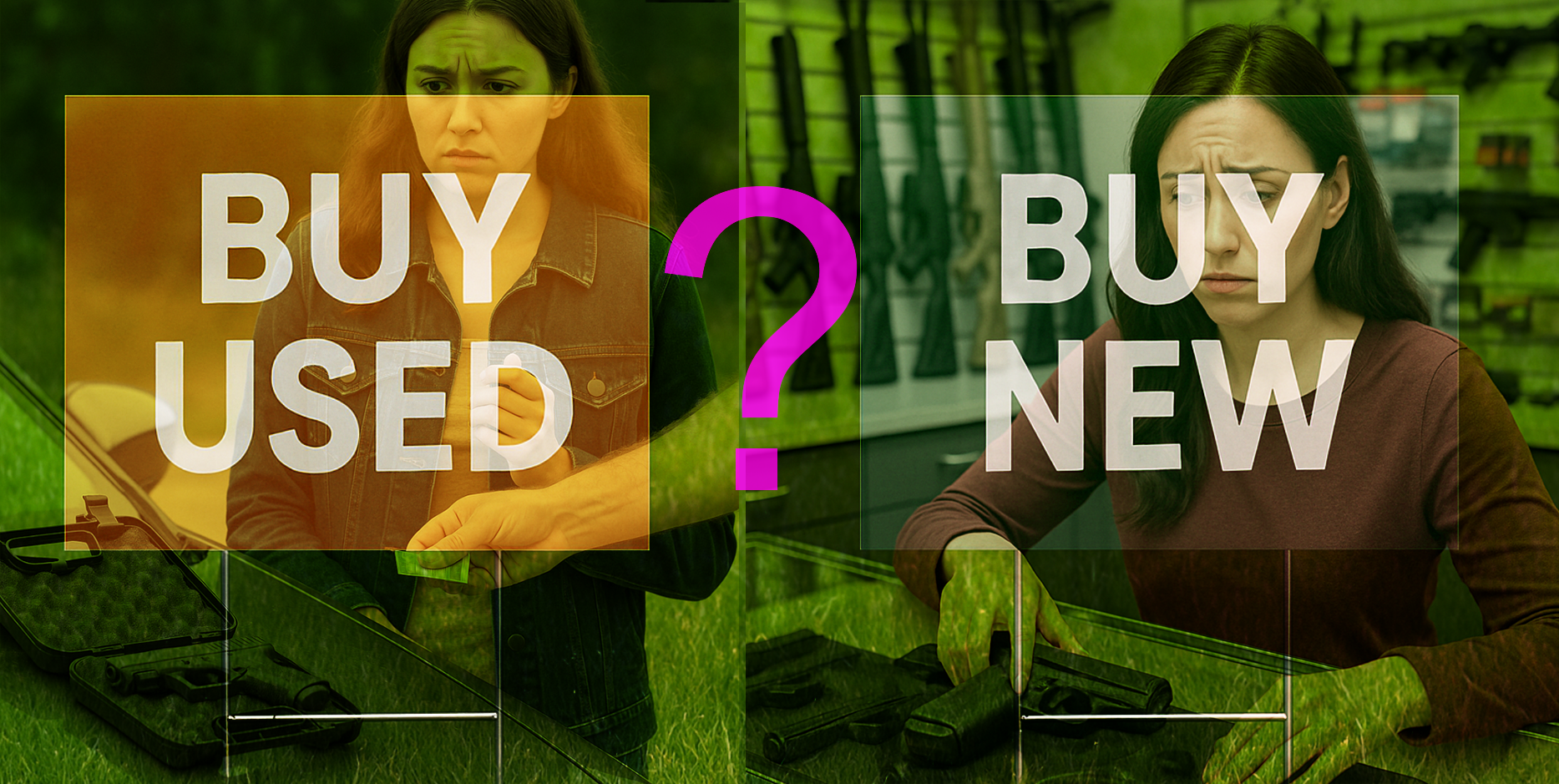Should You Buy a New or Used Handgun?
This post covers the pros and cons of buying a new vs. a used handgun, including considerations for safety, cost, condition, and reliability. Learn how to assess the best option for your needs.

Once you've decided to buy a handgun for self-defense, one of the first questions you'll face is whether to purchase it new or used. For experienced gun owners, buying used can be a great option to find rare items, or get a good deal. For new gun owners though, it's not so simple. Each option has pros and cons, and the right choice depends on your comfort level, budget, and how much confidence you want to have in the gun’s history and condition. Let’s walk through the key factors on buying your first gun from the specific lens of a self defense gun.
Safety and Liability
Buying a handgun from a licensed dealer means you're working within a legal framework designed to protect both the buyer and the seller. Dealers are required to conduct background checks and maintain sales records, giving you peace of mind that everything is above board. On the other hand, purchasing a used gun through a private sale introduces potential risks. You might not know the full legal history of the firearm, and meeting someone you don’t know to buy a gun can carry its own safety concerns. If you’re new to guns, these risks might outweigh any cost savings.
Cost Considerations
There's no question that used handguns are often cheaper than new ones. That lower price can be attractive, especially if you're on a tight budget. However, a new gun typically comes with a manufacturer’s warranty and is guaranteed to be in perfect working order. You also know exactly what you’re getting—no mystery about how it was stored, how often it was fired, or whether it was maintained properly.
Condition and Reliability
A new handgun gives you the confidence that every part is in factory condition. It hasn’t been dropped, modified, or neglected. You’re the first owner, and the gun’s performance is consistent with how the manufacturer intended it to run.
Some people argue that a used gun might actually be more reliable because it’s “broken in”—meaning it has already cycled rounds and settled into regular use. That can be true in some cases, especially for models that tend to loosen up a bit after the first few hundred rounds. But unless you know the seller personally or have detailed maintenance records, it’s a gamble. The previous owner might be selling it because it’s unreliable, has a mechanical issue, or just wasn’t taken care of properly. And none of that is likely to show up in a casual inspection.
If you’re new to guns, the guesswork involved with used firearms may not be worth the savings. A new handgun removes that uncertainty and gives you a clean slate from day one.
Customization and Features
One of the benefits of buying a new handgun is that you can select the exact model, features, and finish you want, all directly from the factory. Everything is set up to the manufacturer’s specifications, which ensures both reliability and legal defensibility.
With a used gun, you're limited to what’s available—and that often includes modifications made by the previous owner. These changes might include aftermarket sights, triggers, springs, or other internal parts. While some upgrades can improve performance, they also introduce uncertainty. You have no way of knowing who installed them, whether the installer was qualified, or if high-quality parts were used. That directly impacts the gun’s reliability.
There’s also a legal consideration. If you ever have to use your firearm in self-defense, the modifications made to it could come under scrutiny. For example, a trigger that has been lightened too far could be interpreted as a sign of reckless intent or poor judgment, especially if it contributes to a negligent discharge. Even if you acted lawfully, a modified gun could complicate your legal defense.
For new gun owners, buying a stock, unmodified firearm from a reputable dealer reduces both the mechanical and legal risks.
Conclusion
For most new gun owners, buying a new handgun is the better path. It provides legal clarity, safety, reliability, and the ability to pick exactly what you want. If cost is a major concern, a used gun can still be a valid option—but only if you’re confident in evaluating its condition or have someone experienced to help you.
Quick Comparison
| Category | New Handgun | Used Handgun |
|---|---|---|
| Safety & Liability | Sold through licensed dealer with background check and paperwork | Private sale may lack documentation; potential safety and legal risks |
| Cost | More expensive, but includes warranty and peace of mind | Lower price, but condition and maintenance history are uncertain |
| Condition & Reliability | Guaranteed new and functional; no prior wear | May have hidden wear or damage; inspection recommended |
| Customization | Easier to get specific model and factory options | May include modifications; could hurt reliability or create legal complications |